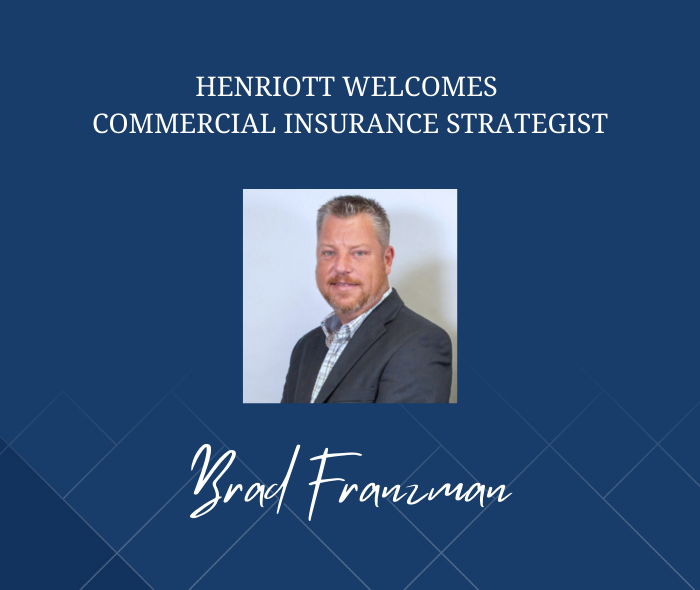LAFAYETTE, IN. – Henriott’s Director of Client Risk Management, Zach Finn, will be speaking at the prestigious Insurance Industry Think Tank, the John Street Club, in New York on June 9th. He will be speaking on “The Pandemic, InsurTech and the Birth of Hybrid Insurance Companies”.
When the COVID-19 pandemic hit, many businesses and lives were affected. There were shutdowns, closings, supply chain issues, and overall, many risk management nightmares
Zach Finn was at the forefront of the pandemic insurance debate from the very beginning. Before the shutdown of March Madness was publicly announced, the Indianapolis Business Journal called “Professor Zach Finn” at Butler University to ask about the economic impact to Indianapolis from the loss of the basketball tournament. Zach immediately knew the implications would go far beyond ticket sales and St. Elmo’s steaks.
With Zach’s background, he managed to be just the right guy at the right time. He earned his Master’s in Risk Management and Insurance and then became a Risk Manager at the J.M. Smucker Company. This led into his next career as a professor at Butler University teaching risk management and insurance while acting as Academic Director of the Davey Risk Management and Insurance Program. He then became the Director of Client Risk Management at Henriott Group.
Zach had the education, knowledge, and experience to sound the economic alarm and help combat the insurance and risk management issues resulting from the pandemic. Once he understood that the entire U.S. economy was going to shut down next, he wrote a memo sounding the alarm that was sent to Indiana Governor, Eric Holcomb, the White House, U.S. Congress, and was published in Risk & Insurance.
“I am writing to warn about a wave of uninsured Business Interruption and event cancellation losses that I see building in the local, state, and national economy. As more and more entities discover these losses are not insured, I believe it has the potential to further destabilize the economy and throw further gas on a fire that needs no more”
This was not an economic crisis in the traditional sense, this is the world’s largest uninsured business interruption claim. This was not a problem that could be solved by banks and stimulus, this was the insurance industry’s opportunity to do what it does best, indemnify and put lives back together. All of it needed to be insured. However, insurance companies have taken the stance that pandemics are largely uninsurable, and that is hurting businesses, schools, and municipal insureds alike.
While the insurance industry was falling behind, businesses were looking to other resources to try and save their companies. Zach carried this conversation to Gary Henriott, former CEO of Henriott Group, and they thought of eliminating the All-Risk coverage form in favor of a new, government backed, Catastrophic Perils coverage form. Like Basic Perils coverage but for terrorism, flood, pandemics, and other catastrophic exposures.
“I think there is an appropriate role for the federal government to play here: the insurance industry is set up from a claims adjudication perspective to be able to work with business owners in a trusted, forthright, straightforward way and save so much heartache and economic dislocation,” said Gary.
Zach points out that we have already solved this problem with volcanic perils coverage. There are three ways to spread risk when creating an insurance pool; across time, across other policyholders and across other risks. You could not standup an insurance company solely to cover the peril of volcanic action. The only folks who would buy coverage would be under a volcano. Instead, we spread this insurance risk across the “Basic Perils” coverage form. When we buy Basic Perils coverage to get the fire, lightening, windstorm, etc. insurance that we care about here in Indiana, we end up kicking in a few cents for the peril of Volcanic Action. That coverage really doesn’t do much for us here in the Hoosier state; however, the money we kick in for that peril helps make the insurance pool work for our friends under Mt. St. Helens.
You essentially have the same problem with pandemics, terrorism, flood, and many other catastrophic perils, adverse selection. The only people who will buy pandemic coverage will be those who were impacted by COVID-19. Essential businesses, and those fortunate enough to adapt their operations, will not have a need for this coverage. There needs to be a way to coax more businesses into the insurance pool.
Now imagine if the only way to get pandemic, flood, or terrorism insurance was to buy government backed Catastrophic Perils coverage. The likelihood of all these catastrophic events happening at once, is extremely low so ideally, this should be a much more cost-efficient way of pooling, and paying, for these losses. It also creates a soft mandate that encourages more businesses to kick in for these black swan events that end up impacting us all as taxpayers. To get coverage for the catastrophic peril(s) you need, you would now need to kick in a little for those you don’t.
“If we don’t act before the next catastrophic pandemic, there will be more economic shutdowns and inflation. And that spreads faster than a virus,” said Zach.
Zach is heading to New York City to share these thoughts and why he thinks the federal government and insurance industry should build a government-backed catastrophic perils coverage form to deal with new mega risks of our time and stabilize insurance markets.
Henriott is a Risk Management and Insurance company with a focus on collaborative partnerships. By offering a broad spectrum of internal solutions and external partnerships in risk management, insurance, group and individual health, human resources, health and wellness, Henriott has demonstrated their commitment to delivering innovative solutions and best in class service when managing the client’s overall cost of risk.
Contact:
Henriott 765-429-5000
Zach Finn 765-429-5001 or zfinn@henriott.com




